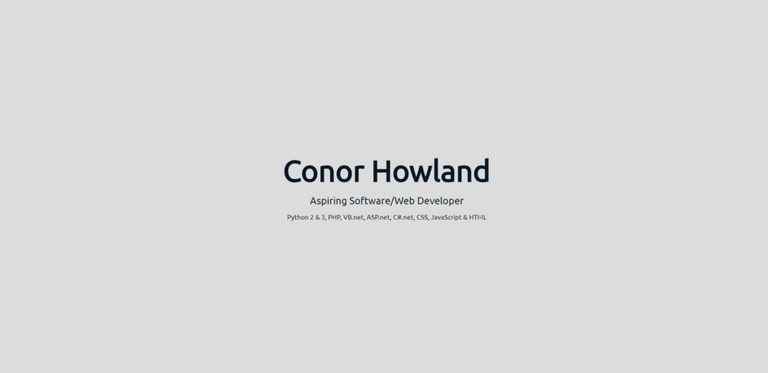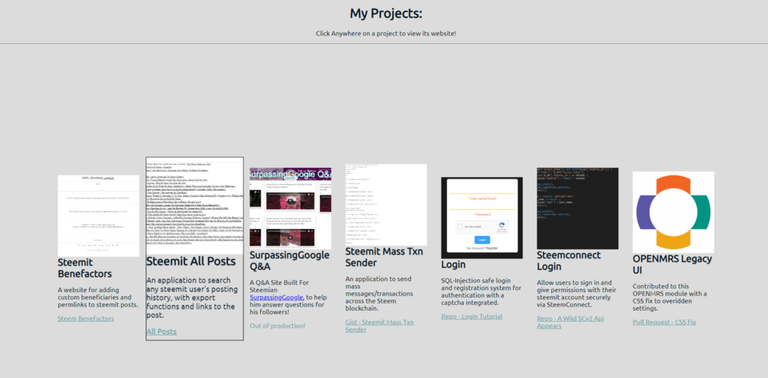Hello Steemians, Check out my new website: https://www.conor.icu/ This is my portfolio site, it includes information about me and has been completely overhauled in design, split into pages.
Also, check out the remnants of a joint blog I hosted: https://www.conor.icu/social-media-lit/
Content From One Of my Posts:
When talking about social media, there are some key concepts that you should have a grasp of, as these will help you to understand the social media ecosystem. These Include:
- Social Presence
- Social Capital
- Social Production
- Social Intelligence
Concepts:
Social Presence
Social presence is the ability of learners to put their personal traits and beliefs into a community. This shows that they are real people.
Real World Examples:
Media such as video conferencing ensure high levels of contact from both ends. Because of this, they can support very interactive teaching wherever. So, this has made online learning possible. The availability of remote conferencing allows people to ‘attend’ things that they would never have been able to see before. Such as a webinar, where normally, users can type to the speaker and also, they can see a video feed from the conference.
Social presence is:
The quality of being present between two communicators using a communication media.
Some types of media have a better social presence than others, like video conferencing beats audio, and audio beats text as they are more present in one over the other because being able to see a moving picture and audio would beat just being able to hear them.
Social Capital:
Qualities of people that are considered tangible, such as goodwill, friendship and understanding to make up a social unit. Sometimes called neighbourliness. Also, it states that relationships and social media are valuable assets.
Trust between individuals thus becomes trust between strangers and trust of a broad fabric of social institutions; ultimately, it becomes a shared set of values, virtues, and expectations within society as a whole. Without this interaction, on the other hand, trust decays; at a certain point, this decay begins to manifest itself in serious social problems… The concept of social capital contends that building or rebuilding community and trust requires face-to-face encounters.
We know that places with higher social capital have better standards. This usually includes better healthcare, higher success and better financial growth.
So, Put simply, social capital is the quality of social interactions in a certain area.
Social Production:
This is people working together to contribute resources to a project of which they are not paid or directly rewarded.
Social production is usually about a digital environment. What is special about this? What means that we keep using it, and keep contributing, for, well, nothing. Also, is it worthwhile for these contributors to do so?
Human nature is not a machine to be built after a model, and set to do exactly the work prescribed for it, but a tree, which requires to grow and develop itself on all sides, according to the tendency of the inward forces which make it a living thing.
“Such are the differences among human beings in their sources of pleasure, their susceptibilities of pain, and the operation on them of different physical and moral agencies, that unless there is a corresponding diversity in their modes of life, they neither obtain their fair share of happiness, nor grow up to the mental, moral, and aesthetic stature of which their nature is capable.”
Examples:
One of the most well known examples is the GNU Open Source Operating System, Linux, maintained for free, by anyone with the knowledge and willing to help out, it benefits every Linux user, and usually the contributors will benefit from their contribution when using Linux, but it can depend on the flavour, such as Debian, Red Hat or Ubuntu
We have come past just wanting to share statuses. We are at the point of collaboration on global projects, that ANYONE can contribute to, as well as smaller projects, as additions/software, that are managed by smaller teams.
This is producing information, knowledge and culture through social means, instead of by using money and proprietary agreements, by co-operating to produce products and individual action, more opportunities are created for people to contribute and use. This leads to a more critical culture, better information sources and a better global community.
Social Intelligence:
Social intelligence is gained over a period time, unlike IQ which you are largely born with. Social intelligence develops over time. Both from success and failures in social settings, it is also known as common sense.
This is indicated by a person’s fluency in speaking and if they are good at conversations. They often stand out in parties because they are often talking to a lot of people and they are usually quite confident. They are also usually good at carrying on conversations. These are social expressive skills.
They know well how social rules work and how to play certain things, they can play various roles in the social economy.
They are also very good at listening. Therefore they can make people feel like they have had a good social connection.
They are also good at working out what makes people tick. They can attune themselves to what others are saying, and how they behaving, so that they can read them and get a grasp of who the person is and their likes and other traits.
To become more socially intelligent, you have to put effort in. Firstly you have to pay more attention to the world around you. You also have to work on becoming a better speaker. You should also begin networking with more people.
Last Updated: 16th April 2018 By Conor Howland. All rights reserved!



